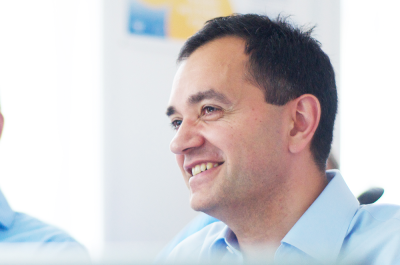#InterimsInAction – D’Arcy Myers on being a charity CEO - Russam

The following appeared in the most recent edition of Russam's #InterimsInAction:
Ian Joseph, Managing Director of Russam, sits down with D’Arcy Myers, a seasoned interim CEO with over twelve years of hands-on experience in the charity sector. D’Arcy excels in strategy and leadership development, mentoring, performance improvement, and significant organisational change. He specialises in working with boards and leadership teams, often stepping in as an interim CEO to foster productive governance cultures and enhance financial management practices.
Passionate about professionalism within the Third Sector, D’Arcy is also a founder of the Small Charities Coalition and Charity2020 and has extensive international experience working across 32 countries. He is a Fellow of the Chartered Institute of Marketing and a trustee of various voluntary organisations.
What inspired you to transition from marketing and business development to working in the Third Sector, and how has this diverse background benefited your role as an interim CEO?
Shortly after marrying my wife, we decided to volunteer with VSO and were posted to the Kingdom of Tonga in the South Pacific. This two-year experience was transformative and inspired me to help others achieve more than they thought possible. It was deeply fulfilling and enriching for both of us, solidifying my passion for the Third Sector.
How has your background in business influenced your role as an interim CEO?
My business background has been invaluable in my interim CEO roles. Drawing on diverse perspectives and applying business rigour to challenging situations has helped charities navigate complex changes effectively.
Can you share an example of a successful organisational change you led as an interim CEO and the key factors that contributed to its success?
I’ve served as an interim CEO for 15 charities, each requiring some degree of change to prepare for a permanent CEO. My approach is to empower staff and the board to make necessary changes collaboratively. For instance, at one charity, we revamped operational processes and fostered a culture of open communication, significantly improving efficiency and morale.
How do you approach strategy and leadership development when working with boards and senior management teams in not-for-profit organisations?
Transition periods are perfect for reviewing what has worked, what could be improved, and how everything aligns with the charity’s current and future needs. During the interim period, I review strategic goals and culture to help the board understand the type of CEO they need to recruit. I consult widely with stakeholders (staff, trustees, funders, service users, etc.) on strategy and impact, and focus on mentoring and coaching for leadership development.
What are some common challenges you encounter when promoting a productive governance culture, and how do you address them?
Boards that have lost their CEO can become overly involved in operational matters, which can undermine staff confidence in the board and vice versa. I help the board understand their role and clarify what they need from staff, ensuring the information they receive is timely, concise, and clear.
With your extensive experience in international work, how do you adapt your strategies to different cultural and organisational contexts?
Every organisation is unique, regardless of location. An interim CEO needs to have an inquiring mind, taking the time to understand the culture and dynamics within the organisation and the context in which they are working. Once this understanding is achieved, I can craft the right approach to take people with me on the journey.

